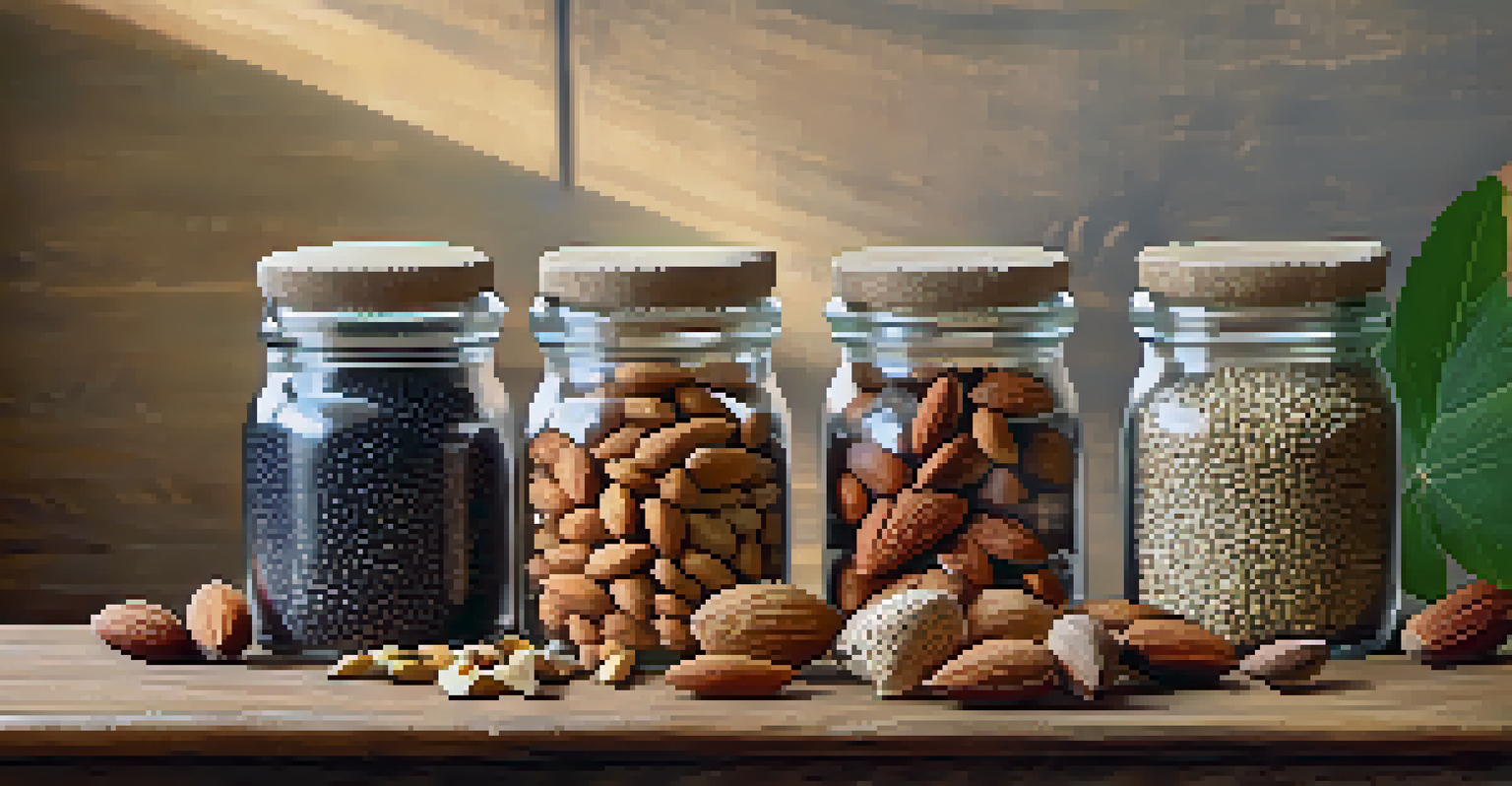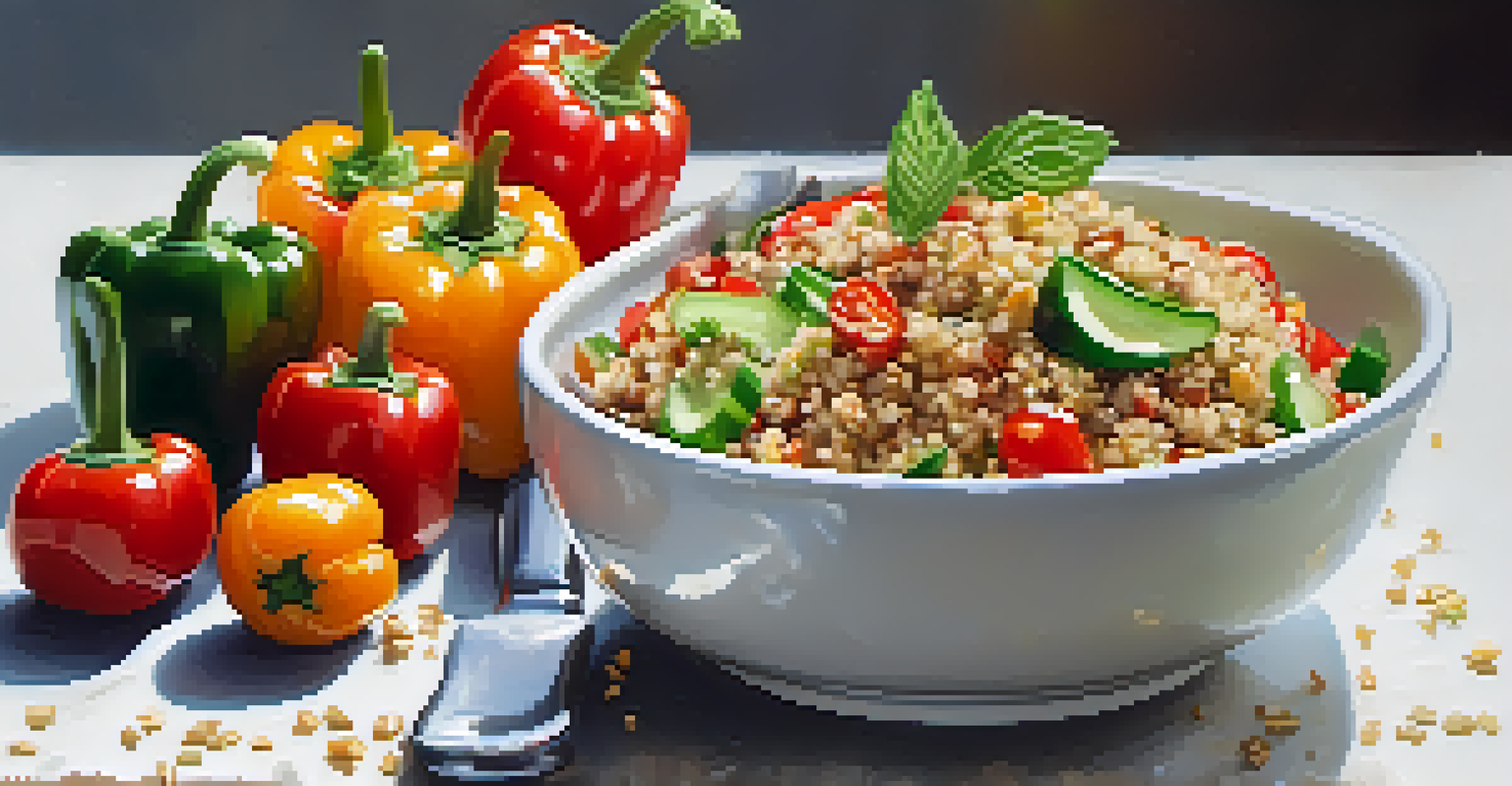Budget-Friendly Plant-Based Protein Sources for Vegetarians

Why Plant-Based Proteins are Essential for Vegetarians
For vegetarians, finding sufficient protein can feel like a challenge. However, plant-based proteins not only provide the necessary nutrients but also come with additional health benefits. They can help in maintaining muscle mass and overall health, making them crucial for a balanced diet.
Let food be thy medicine and medicine be thy food.
Moreover, incorporating a variety of plant-based proteins can prevent monotony in meals. This encourages creativity in cooking, pushing you to explore different cuisines and flavors. With so many options available, you can easily enjoy delicious meals while meeting your dietary needs.
Related Resource
Ultimately, understanding the importance of plant-based proteins can lead to better health choices. It’s not just about getting enough protein; it’s also about enriching your diet with fiber, vitamins, and minerals that support overall well-being.
Lentils: The Versatile Protein Powerhouse
Lentils are a fantastic source of protein, packing around 18 grams of protein per cooked cup. They are incredibly versatile, lending themselves to soups, salads, and even veggie burgers. Plus, they cook relatively quickly, making them a convenient option for busy weeknights.

Not only are lentils budget-friendly, but they are also high in fiber, which aids digestion and helps you feel full longer. This means you can stretch your meals and save money, all while enjoying hearty portions. Their earthy flavor pairs well with various spices, allowing for endless culinary creativity.
Plant Proteins Boost Health
Plant-based proteins are essential for vegetarians, providing not just adequate protein but also important nutrients that support overall health.
From red to green, lentils come in various types, each with a unique flavor and texture. Whether you’re making a comforting lentil stew or a refreshing lentil salad, this protein source can easily fit into any meal plan.
Chickpeas: A Protein-Rich Pantry Staple
Chickpeas, or garbanzo beans, are a beloved staple in many kitchens, and for good reason. These legumes offer about 15 grams of protein per cooked cup and can be used in numerous dishes. From hummus to curries, their nutty flavor and firm texture make them a favorite among vegetarians.
The food you eat can either be the safest and most powerful form of medicine or the slowest form of poison.
What’s more, chickpeas are incredibly affordable and can be bought canned or dried. While dried chickpeas do require soaking and cooking, they can be prepared in bulk and frozen for later use. This can be a real money-saver and ensures you always have a protein source on hand.
Related Resource
In addition to their protein content, chickpeas are rich in vitamins and minerals, such as iron and magnesium. They help to boost energy levels and improve overall health, making them an ideal choice for those looking to maintain a balanced diet.
Quinoa: The Complete Protein Grain
Quinoa is often hailed as a superfood, and it’s easy to see why. This ancient grain is not only gluten-free but also contains all nine essential amino acids, making it a complete protein. With about 8 grams of protein per cooked cup, quinoa is an excellent addition to any vegetarian diet.
Beyond its protein profile, quinoa is also packed with fiber and various nutrients, including iron and magnesium. It has a slightly nutty flavor and a fluffy texture that makes it a delightful base for salads or grain bowls. Plus, it cooks in about 15 minutes, making it a quick and nutritious option.
Diverse Options Enhance Meals
Incorporating a variety of plant-based proteins like lentils, chickpeas, and quinoa encourages creativity in cooking and prevents meal monotony.
While quinoa can be a bit pricier than other grains, buying in bulk can help reduce costs significantly. Incorporating quinoa into your meals a few times a week can enhance your diet without breaking the bank.
Tofu: The Protein Chameleon of Plant Foods
Tofu is often considered a go-to protein source for vegetarians, and it’s no wonder why. With about 20 grams of protein per cup, tofu is highly versatile and can absorb flavors from your favorite sauces and spices. Whether you grill, stir-fry, or scramble it, tofu can fit seamlessly into any dish.
One of the best things about tofu is its affordability. It’s available in various textures, from silken to extra-firm, allowing you to pick the right type for your recipes. Plus, it’s a great source of calcium, making it beneficial for bone health.
Related Resource
Tofu can also be a great meat substitute for those transitioning to plant-based diets. By experimenting with different marinades and cooking techniques, you can create satisfying meals that even meat-lovers will enjoy.
Beans: The Budget-Friendly Protein Family
Beans are a cornerstone of vegetarian diets, providing an impressive protein punch of about 15 grams per cooked cup. With so many varieties—black, kidney, pinto, and more—you can easily switch things up to keep your meals exciting. Beans are also rich in fiber, which can help with digestion and weight management.
One of the biggest advantages of beans is their cost-effectiveness. Canned beans are incredibly affordable and ready to use, while dried beans can be cooked in large batches for meal prep. Incorporating beans into your diet can help stretch your food budget without sacrificing nutrition.
Budget-Friendly Protein Choices
Many plant-based protein sources, such as beans and nuts, are affordable and can help stretch your food budget while maintaining nutritional value.
From hearty bean soups to spicy chili, the possibilities are endless. By adding beans to your meals, you can enhance both the protein content and the flavor, making them a staple in your kitchen.
Nuts and Seeds: Small Protein Powerhouses
Nuts and seeds may be small, but they pack a powerful protein punch. Almonds, chia seeds, and hemp seeds are particularly noteworthy, offering around 6-8 grams of protein per ounce. They are also loaded with healthy fats, making them a great addition to smoothies, salads, or snack time.
Though nuts and seeds can be a bit more expensive than other sources, buying them in bulk can lower costs significantly. Additionally, they have a long shelf life, which makes them a convenient option for stocking your pantry. A handful of nuts or a sprinkle of seeds can elevate your meals both nutritionally and flavor-wise.

Being rich in antioxidants and vitamins, nuts and seeds also support overall health. Incorporating a variety of these protein sources can contribute to heart health and provide sustained energy throughout the day.
Conclusion: Building a Balanced, Budget-Friendly Diet
Incorporating budget-friendly plant-based protein sources into your diet doesn’t have to be overwhelming. By exploring the options discussed, you can create meals that are not only nutritious but also exciting and flavorful. From lentils to nuts, there’s something for everyone.
Remember, variety is key when it comes to nutrition. Mixing different protein sources can help you get a broader range of amino acids and nutrients. Plus, experimenting with new recipes can make cooking an enjoyable experience.
Ultimately, with a little planning and creativity, you can build a balanced diet that supports your vegetarian lifestyle without stretching your budget. Happy cooking!